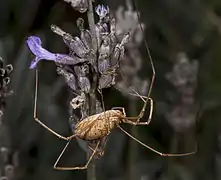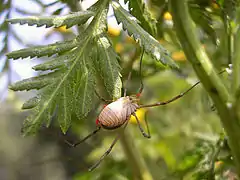Phalangium opilio
Phalangium opilio is "the most widespread species of harvestman in the world", occurring natively in Europe, and much of Asia. The species has been introduced to North America, North Africa and New Zealand.[1] It is found in a wide range of habitats, including meadows, bogs, forests, and various types of anthropogenic habitats, such as gardens, fields, hedgerows, lawns, quarries, green places in built-up areas, walls and bridges.[1] Phalangium opilio is known to feed on Helicoverpa zea eggs, and thus can act as biological pest control for soybean crops. The species is nocturnal, as is typical of opilionids.[2]
| Phalangium opilio | |
|---|---|
 | |
| Male Phalangium opilio | |
| Scientific classification | |
| Kingdom: | |
| Phylum: | |
| Class: | |
| Order: | |
| Family: | |
| Genus: | |
| Species: | P. opilio |
| Binomial name | |
| Phalangium opilio | |
Description
Females have a body length of 6–9 mm (1⁄4–3⁄8 in), males are slightly smaller at 4–7 mm (3⁄16–1⁄4 in). Males however have longer legs; the second leg is about 54 mm (2 1⁄4 in) in males and 38 mm (1 1⁄2 in) in females. Males and females are similarly coloured and marked, although males' markings tend to be less clear. The body has a three-lobed darker "saddle", usually with spots or dashes in the midline. Mitopus morio has a very similar appearance, but P. opilio can be distinguished by the two pale "denticles" (small teeth-like structures) below the anterior margin of the carapace. Males have long forward-pointing "horns" on the second segment of their chelicerae.[3]
 Female
Female Male with Trombidium sp.'; note the "horns" on the chelicerae
Male with Trombidium sp.'; note the "horns" on the chelicerae Female side view
Female side view Female bottom with a Trombidiformes mite
Female bottom with a Trombidiformes mite Female
Female
References
- Tone Novak; Vesna Klokočovnik; Saša Lip ovšek Delakorda; Dušan Devetak; Franc Janželpvoč (2009). "Preferences for different substrates in Phalangium opilio (Opiliones: Phalangiidae) in natural environment" (PDF). Acta Biologica Slovenica. 52 (1): 29–35.
- Allard, Cora; Yeargan, Kenneth (September 2005). "Diel activity patterns and microspatial distribution of the harvestman Phalangium opilio (Opiliones, Phalangiidae) in soybeans". The Journal of Arachnology. 33 (3): 745–752. doi:10.1636/T04-17.1. S2CID 85825506. Retrieved 16 October 2020.
- Jones, Dick (1983), The Countrylife Guide to Spiders of Britain and Northern Europe, Feltham, England: Country Life Books (Hamlyn), p. 310, ISBN 978-0-600-35665-3
| Wikimedia Commons has media related to Phalangium opilio. |